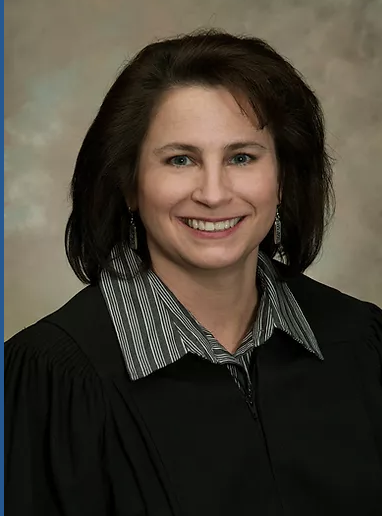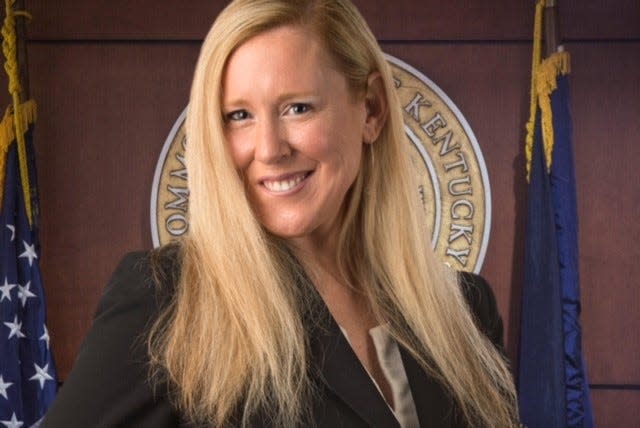Signing warrants? Circuit Judge candidates weigh in on accuracy and safety
The death of Breonna Taylor spurred conversation about the use of search warrants. Louisville banned the use of the no-knock warrants with Breonna's Law and the state of Kentucky limited their use, allowing them in only specific circumstances.
Kentucky Attorney General Daniel Cameron's statewide Search Warrant Task Force released a report in December that included eight recommendations "for the consideration of all Kentucky state agencies involved in the search warrant process."
The Courier Journal, asked Circuit Court Judge candidates about approving warrants. Their answers are below. Every voter will select a judge in each division.
Judicial races are nonpartisan, meaning they are not party-affiliated. Candidates do not campaign on issues, they campaign on merit and experience. This also means that voters can not rely on party affiliations when voting in the upcoming election. To help with this, The Courier Journal along with community partners, will host a Candidate Forum for Circuit Court, Court of Appeals and Kentucky Supreme Court on Oct. 6, at the Louisville Bar Association from 4-6 p.m. This forum is open to the public and will be livestreamed by The Courier Journal. Candidates will answer different questions than the ones asked for this publication.
If you missed the District Court Forum on Sept. 22, you can watch it again here.
More:Citizens for Better Judges backs judge who signed Breonna Taylor search warrant
Warrants have been an issue in recent years. How would you approach the issuance to ensure fairness, accuracy and the safety of the community?
Division 4
Ebert Haegele
"The law limits a judge’s ability to conduct his/her own independent investigation into facts presented in a search warrant, and as judge, I will not exceed the bounds of what the law permits me to do. However, I will review and scrutinize every search warrant presented to me to ensure both a factual and legal basis exists which necessitate the search."
Julie Kaelin
"I have approached this issue head-on. In 2020, I proposed sweeping search warrant reform that would curb judge-shopping in District Court, require far better record-keeping and increase transparency, all of which could give the public more confidence in the system. When this proposal was called for official vote, my fellow District judges first voted to cast their votes in secret by email, which I had never seen happen. I was the only judge who voted no to secret voting. My proposed reforms did not pass, and because the vote was secret, I do not know how any other Judge voted. During this time, it was also discovered that many judges' signatures were unreadable on search warrants. Only one judge consistently also printed their name, and it was me. Official warrant forms now have a line for this. Authorizing a search warrant is an incredible infringement on a person's Constitutional rights, and cannot be taken lightly. I have made real change, and will continue to push for improvement."
Division 5
Tracy Evette Davis

"A judge authorizing the search of a dwelling, business, car, etc is a significant intrusion and requires strict adherence to existing legal and administrative standard to protect the constitutional safeguards citizens have from unreasonable searches and seizures. They are an important tool used by law enforcement where criminal activity is taking place or has taken place. My approach would be to review information thoroughly, look at the timeliness of the facts given in the search warrant, if there are any concerns to go back and ask questions of the requesting officer, prosecutor, investigator, etc. to assure there is probable cause for the issuance of the warrant at the time of signing. In addition, I would weigh in the possible safety concerns of those who would be near the area where the search was to take place to assure safety of all involved, including the potential suspect, persons within the premises, innocent bystanders and officers executing the warrant."
Mary M. Shaw

"Reviewing search warrants prepared by police officers is a part of a circuit judge's duties. Each warrant must be carefully reviewed and only signed when probable cause is found. I am in favor of the recommendation that an officer have a prosecutor review the warrant before presenting it to a judge. The more people involved in the warrant process - the better."
More:Not all Appellate Court Judge candidates have experience on the bench. Who's qualified?
Division 7
Melissa Logan Bellows

"As a Judge, it is an enormous responsibility to ensure that the search warrants are supported by adequate evidence before signing them. As our community has seen before, the ramifications can be tragic. I would hold to the highest standards regarding the issuance of search warrants, to ensure that there is a fair and just cause for issuing the warrant. That being said, we still need search warrants to keep our community safe from violence. If we work diligently with law enforcement to ensure that there is adequate cause and that the search warrants are executed properly, there should be better outcomes all around"
Theodore “Ted” Shouse

"I have advocated for search warrant reform for years. Currently, police officers can choose which judge to present a warrant application to. Nowhere else in the court system does a party get to pick their judge. Judges should be randomly assigned to review search warrant applications.
"The conversation between the police officer and the judge should be recorded—just like every other conversation between litigants and judges. This is not done currently. The tape of that conversation should be sealed until the warrant has been served. Then it should be turned over to the defendant as part of the normal discovery process so that the defendant will know what was said. That is important information about the investigation. Rejected warrant applications that should be filed and made available after charges have been filed."
Division 9
Sarah Clay

"Search warrants have been an issue for good reason. Currently, no record is made of the discussion that occurs between a warrant-seeking officer and judge, and officers are able to choose what judge they go to when seeking to have a warrant signed. I think transparency in the court system is of paramount importance. I would advocate for a local rule change that would require the discussion between the judge and officer to be recorded and thereafter made available to counsel in the case. In conjunction with that rule change, I would support the random assignment of judges to warrant applications. "
Nichole Taylor Compton

"The Constitution gives each person sacred rights, including those afforded under the 4th Amendment against search and seizure. Our forefathers valued those rights enough to enumerate them. Searches are only allowed in narrowly-tailored instances.
"Search warrants are necessary in some cases. However, judges must give each case individualized consideration.
"Judges are tasked with approving (or disapproving) and signing search warrants. Given the role of creating checks and balances, I would be a judge who uses common sense and care. With each instance, as a good judge would, I would read and evaluate the information given by the officers or requesting agency, ensuring the info is valid and verified. If a search warrant request appeared unjustified or unnecessary, I'd inquire or require additional information. I'd only make the best sound decision before authorizing.
"We have witnessed many instances where our system has failed to do so, failing our community. We have seen how misuse or overuse violates rights and tarnishes reasonable searches. The people of Jefferson County deserve safety, fairness, and to enjoy our constitutional rights. Signing search warrants will never be a rubber-stamped task in my judicial tenure. Too much is at stake."
More:Judges are the referees of our legal system and must remain impartial on the bench
Division 10
Dorislee Gilbert

"As required by law, I will thoroughly review every search warrant application presented to me and sworn to before me by an officer with knowledge of the facts. If additional information is required or orally offered to support the grant of the search warrant, I will require that it be included in the written affidavit in order to make a complete and reviewable record. I will be mindful of legal requirements like a nexus between the crime being investigated and the evidence sought, lack of staleness of evidence and establishment of reliability of confidential informants. As required by the Constitution, I will require probable cause for issuance of a search warrant. I will follow recently enacted laws regarding higher standards for no-knock warrants. With my many years of experience as a felony prosecutor, particularly one who advised other prosecutors regarding legal issues, I am equipped to judge the legal sufficiency of search warrant applications."
Patricia "Tish" Morris

"First each warrant must be scrutinized and thoroughly reviewed before signing. Secondly, any outside influence or political motivation must be removed from the judiciary when signing the search warrant. Finally, those judges that sign the search warrants that lead to negative unwarranted danger to the community must be held accountable."
This article originally appeared on Louisville Courier Journal: Signing warrants? Here's what Circuit Judge Candidates have to say

